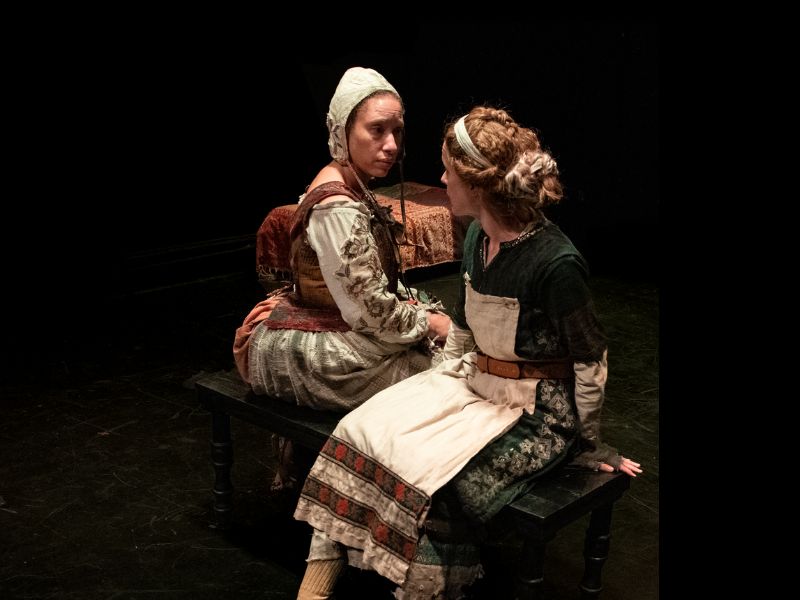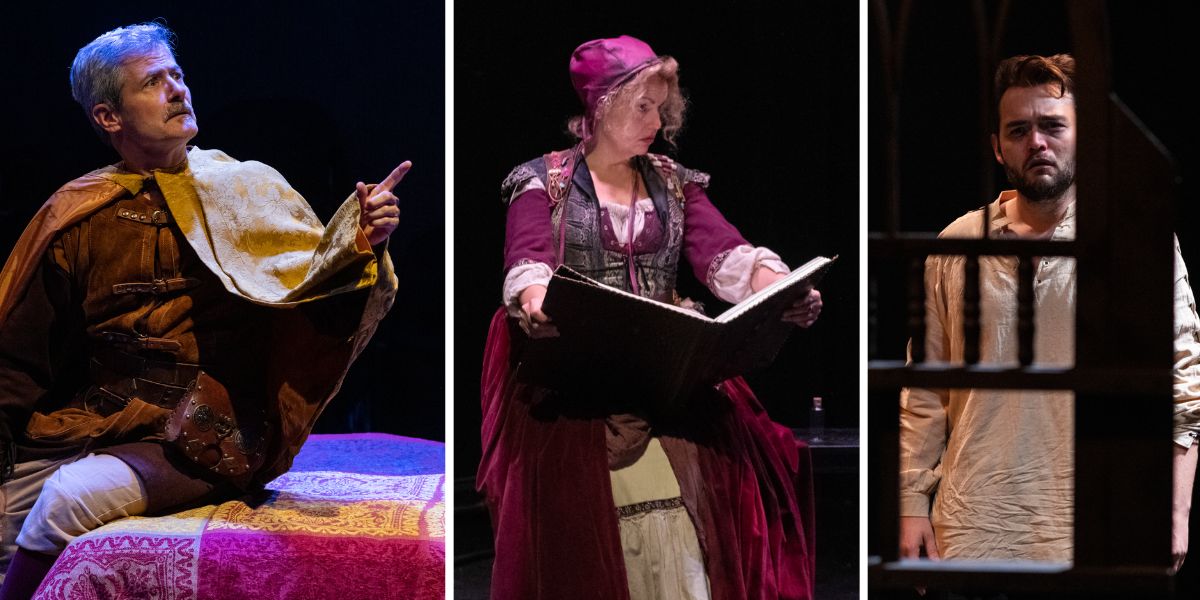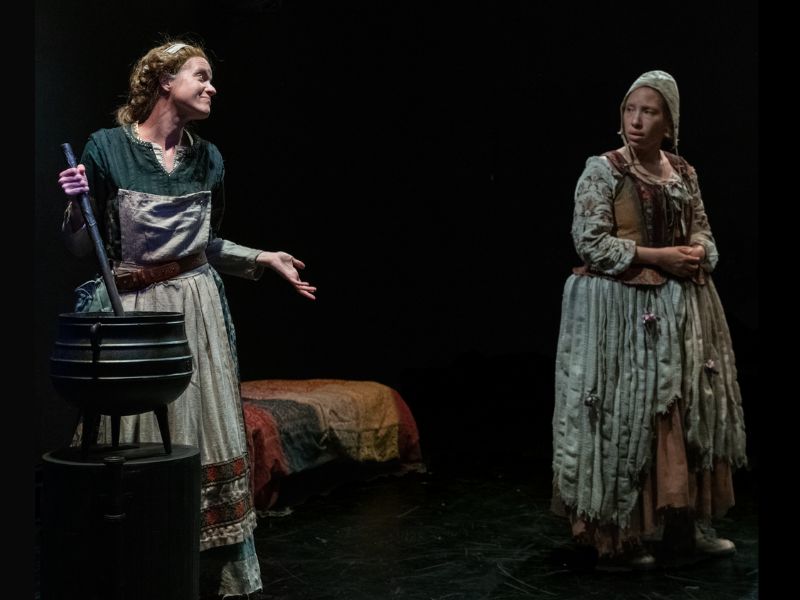Mounting a play set during the Middle Ages bubonic plague might seem too on-the-nose for these COVID’ed days. Then again, maybe now’s a good time for imaginative and edifying storytelling, à la Canterbury Tales. How about, for instance, a charmingly comical adult fairy about love in a time of pandemic? Lindsay Carpenter’s Our Black Death: Plagues, Turnips, and Other Romantic Gestures would fit that bill to a tee.
In it, two queer peasant women are passionately in love. As lights come up and the play begins, they are astride a bench in a steamy, lengthy make-out session, and they are so into each other it’s as though we the audience are not there.

We’ll learn that one of them, named Frol (a shrewd and sharp Esther Williamson), is a realist and pragmatist: ‘No one lives,” she says bluntly. “You get sick, you die. It’s simple.”
And we’ll learn that the other, named Bit (a still-waters-deep Dawn Thomas Reidy), is a romantic fabulist. In her view everyone is dying “because they don’t love each other like we do. You and I are going to survive the plague because we’re special, because our love is special. We’ll survive.”
Of course, only one of these two lovers can be correct, and thereby hangs the tale.
Taffety Punk’s enjoyable staging of Black Death in the black box at Capitol Hill Arts Workshop is both barebones and opulent. The audience sits on two sides of a small playing area where set pieces — a table, a door, a bed, a cooking pot — are carried on and off. During scene changes can be heard magnificent rock-of-middle-ages cello and percussion music credited to Garland of Hours, and Jen Gillette has dressed the cast in costumes adorned with such rich layered tapestries of fabrics and leathers and textures and colorful detail that seen up close these clothes seem the quality of grand opera.
That heated clutch between Frol and Bit is interrupted by the offstage hacking cough of Frol’s dying husband; and once he’s dead, Frol sheds not a tear but instead sets his body on fire and implores Bit in a flurry of flower petals to move in with her. Bit doesn’t because her own husband is for the moment still alive (his demise will come as no surprise). Yet Bit’s and Frol’s assignation proceeds apace.

There is a third peasant woman character, Lovesick Lady (a knowing and needy Tonya Beckman), who has the hots for an unnamed Man (a lusty and dimwitted Gregory Scott Stuart). This Man doesn’t actually have a lot on the ball except he wears a hat she fancies. Lovesick Lady, however, has a knack for casting spells, which comes in handy for abetting romantic pursuits, including an amusing workaround for the Man’s deficient communication skills: Her spell cures his persistent silence and he forthwith delivers a logorrheic monologue about peeing. They then have some spicy sex scenes of their own.
In an abrupt plot turn, Bit takes a job at a nearby castle tending to an unnamed Nobleman (a woebegone Connor Padilla ), who has quarantined himself in fear of infection. He’s all alone; everyone on his staff has perished. He’s also a bit of a simpleton and helpless because he never had to do anything for himself. Bit teaches him some basic life skills: how to start a fire, how to empty a chamber pot. They end up spending a lot of time together, to the extent that Frol fears the Nobleman is stealing Bit from her. But Bit makes clear to the Nobleman that she’s in love with Frol and unavailable: “And our love is real,” she tells him. “It’s the reason I’m not going to die.”
“How do you know you love her?” the disappointed Nobleman asks.
Bit’s reply is precious: “How do you know you’ll remember to take your next breath? It’s easy. It’s impossible not to.”

Marcus Kyd’s effective direction shapes the unfolding scenes with keen attention to pace and placement, always a challenge in alley staging. Chris Curtis achieves splendid lighting effects in that small space including a red spot on the floor for fire, green strip lights for spells, and an evocative chiaroscuro on the lovers. Lorraine Ressegger’s intimacy direction convinces stirringly, and her choreography for a fight near the end is astonishingly scary.
The playwright Lindsay Carpenter has been involved in rehearsals, and I understand some changes resulted. My sense is that for future iterations the script could benefit from more focus on the through-line of the Frol-and-Bit love story and some trimming of the protracted side stories. At times we lose touch with the show’s main emotional motor, which, to the play’s great credit, has powerful and poetic implications for anyone precariously in love in the face of mortality.
Running Time: 90 minutes with no intermission.
Our Black Death: Plagues, Turnips, and Other Romantic Gestures plays through October 8, 2022, presented by Taffety Punk performing at Capitol Hill Arts Workshop, 545 7th Street SE, Washington, DC. Purchase tickets ($15) online.
COVID Safety: Capitol Hill Arts Workshop requires masks (N95 or KN95) for all people entering the building. CHAW’s complete COVID-19 Safety Protocols are here.
Our Black Death: Plagues, Turnips, and Other Romantic Gestures
By Lindsay Carpenter
CAST
Tonya Beckman (Lovesick Lady), Connor Padilla (Nobleman), Gregory Scott Stuart (Man), Dawn Thomas Reidy (Bit), Esther Williamson (Frol)
PRODUCTION AND CREATIVE
Director/Sound Design: Marcus Kyd. Lighting Designer: Chris Curtis. Costume Designer: Jen Gillette. Associate Costume Designer: Elizabeth Haley Morton. Fight and Intimacy Director: Lorraine Ressegger. Choreography: Kelly King. Props & Scenic Manifestation: Lisa Bruneau, Marcus Kyd, MK Bailey. Stage Manager: Katie Buchwell. Music: Garland of Hours. Assistant Director: Ashara Crutchfield. Managing Director: Erin Mitchell Nelson. Assistant Stage Manager: Caroline Johnson. Production Assistants: Katie Murphy, Rachel Johns, Hunter Ringsmith.




